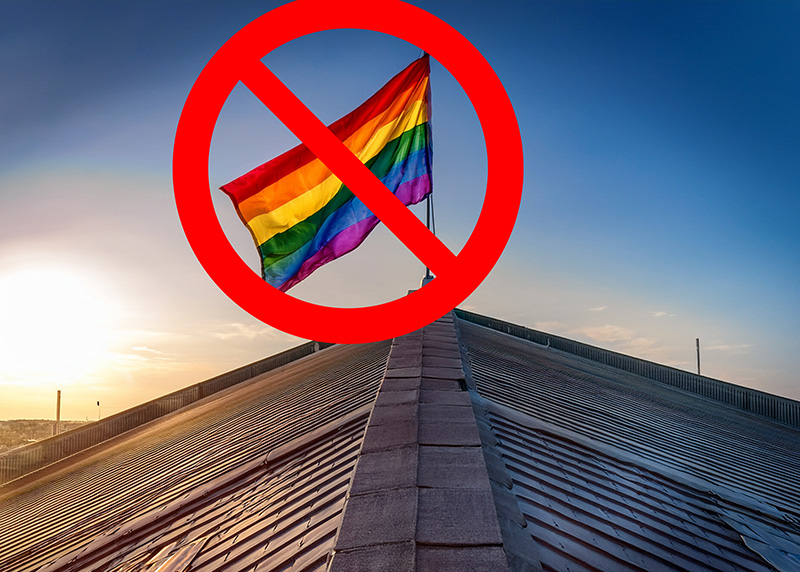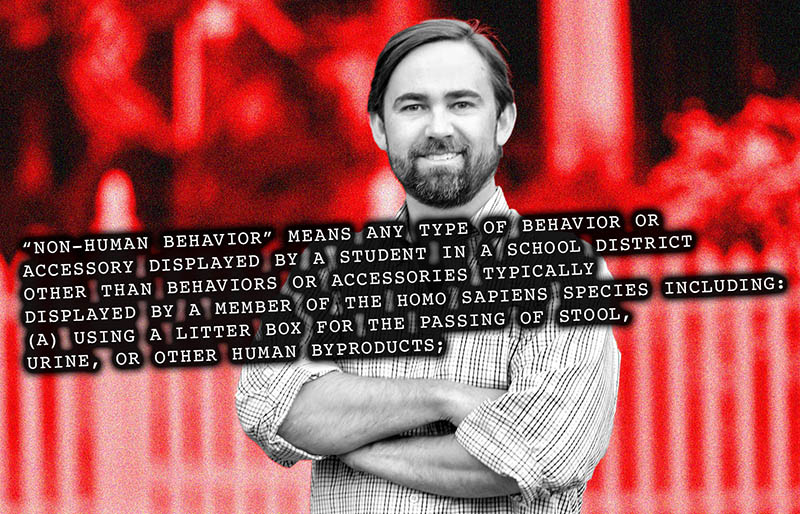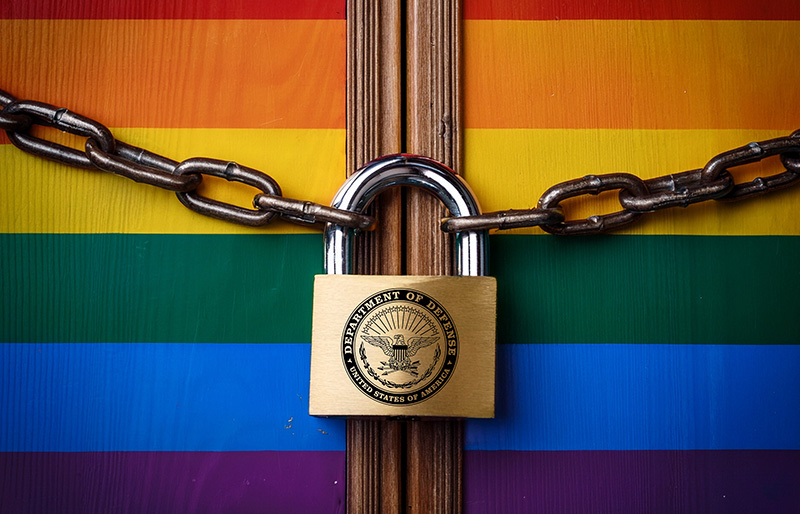PFLAG and PFOX Debate MCPS Fliers on News Channel 8
Pro-LGBT organization counters ''ex-gay'' organization's claims as Montgomery County considers changes to flier-distribution guidelines
The ongoing debate regarding distribution of fliers by the group Parents and Friends of Ex-Gays (PFOX) to students at Montgomery County Public Schools (MCPS), countered by fliers from the pro-LGBT organization Parents, Families and Friends of Lesbians and Gays (PFLAG), got a larger audience March 15 when it hit the airwaves on TBD-News Channel 8.
The PFOX fliers, sent home to students at Kensington’s Albert Einstein High School along with their report cards Feb. 1, advise there is no scientific evidence of sexual orientation being innate, that people can choose to be heterosexual, and encourage readers to contact PFOX or other organizations with ”ex-gay” ministries.
According to David Fishback, advocacy chair for the Metro DC PFLAG chapter, since 2006 PFOX has distributed similar fliers at Winston Churchill High School in Potomac, Montgomery Blair High School in Silver Spring, Bethesda-Chevy Chase High School and Walt Whitman High School in Bethesda. Fishback told Metro Weekly that PFLAG has distributed fliers via MCPS four times – in 2006, 2007, 2008 and 2010 – to all high schools in the county. In general, he said, PFLAG has used the flier-distribution program in response to actual or anticipated distributions by PFOX.
Fishback, speaking on behalf of PFLAG, sparred with Peter Sprigg, a senior fellow for policy studies at the Family Research Council and a board member of PFOX, in a debate hosted by TBD-News Channel 8 reporter Bruce DePuyt during the March 15 episode of his show, NewsTalk.
”PFOX touts the notion that people can overcome their feelings of gender attraction, and states on their website that sexual orientation therapies have proven to be effective,” Fishback said. ”Now the problem with that is this is a false notion, the idea that people can change their sexual orientation through therapies.
”This notion can lead to bullying. It can lead students or their parents to seek out therapies that are very, very harmful, very dangerous, even lead to depression and suicide. And for that reason, those therapies have been rejected by every American mainstream medical and mental health professional association, including the American Medical Association.”
PFLAG argues the fliers are harmful because they imply that homosexuality is a choice, an idea that could potentially create a hostile atmosphere and make it easier to bully LGBT children for nonconformity. It also rejects the emphasis on conversion or reparative therapy as a way to ”cure” homosexuality.
Sprigg countered Fishback’s argument, saying the PFOX fliers do not denounce homosexuality or label it a mental disorder. Rather, he said, they address the notion that many young people have confusion over their sexual feelings, and that those who have unwanted sexual attractions can change.
”Anyone who takes offense at this flier is reading into it things that simply are not there,” Sprigg said of those who object to the flier.
He also said that PFOX asks for tolerance, not only of gays, but ex-gays who have struggled with and overcome their unwanted sexual orientations. Sprigg said people who are unhappy with their sexual orientation should have the right to self-determination, meaning they can choose to pursue so-called reparative therapies if they desire.
The debate strayed temporarily when Fishback criticized Sprigg’s claim of tolerance, accusing him of telling MSNBC host Chris Matthews that Sprigg thought homosexuality should be criminalized. In turn, Sprigg accused Fishback of changing the subject, telling him and DePuyt that PFOX has not taken an official stance on the criminalization of homosexuality. He also refused to comment on his work related to the Family Research Council and whether he had made such comments in that capacity. But shortly thereafter Sprigg also said there were ”demonstrable harms associated with homosexual conduct.”
The U.S. Court of Appeals for the Fourth Circuit has ruled that Montgomery County’s refusal to allow a Christian group to distribute fliers constituted viewpoint discrimination, prompting MCPS to establish specific guidelines governing which fliers could be sent home with students’ report cards. The flier program, as it currently functions, allows registered nonprofits to send home fliers with students four times a year. Most fliers are from the county school system, the local PTA, local businesses or afterschool/out-of-school activities. All fliers must include a disclaimer that reads, ”These materials are neither sponsored by nor endorsed by the Board of Education of Montgomery County, the superintendent, or this school.”
In the course of the debate, Fishback mentioned that MCPS has plans to evaluate the effectiveness of the flier program.
Dana Tofig, a spokesman for MCPS, said the Montgomery County Board of Education has voted to send policy guidelines regarding distribution of fliers and informational materials to its policy committee for review. According to Tofig, the committee will soon begin the process of determining whether the program is an effective way of distributing information.
In the meantime, Fishback told Metro Weekly that PFLAG is planning to distribute 50,000 fliers in mid-April. Along with PFLAG information, they fliers will also contain materials from the Equality Maryland Foundation, which is partnering with the Southern Poverty Law Center’s ”Teaching Tolerance” program in order to provide schools with necessary resources to combat prejudicial or anti-gay misinformation.
Fishback also said the PFOX claims highlight misconceptions that need to be addressed by MCPS in its health education curriculum, which forces teachers to follow a tightly scripted syllabus, meaning some topics cannot be addressed unless a student asks a direct question of the teacher.
”Whatever the school system does with the flier program,” he said. ”It is imperative that MCPS change its health curriculum standards to allow teachers to affirmatively – not just in response to a question from a student – discuss the discredited notion that being gay is an illness, and allow them to talk about the mainstream rejection of these kinds of ‘therapies.”’
Support Metro Weekly’s Journalism
These are challenging times for news organizations. And yet it’s crucial we stay active and provide vital resources and information to both our local readers and the world. So won’t you please take a moment and consider supporting Metro Weekly with a membership? For as little as $5 a month, you can help ensure Metro Weekly magazine and MetroWeekly.com remain free, viable resources as we provide the best, most diverse, culturally-resonant LGBTQ coverage in both the D.C. region and around the world. Memberships come with exclusive perks and discounts, your own personal digital delivery of each week’s magazine (and an archive), access to our Member's Lounge when it launches this fall, and exclusive members-only items like Metro Weekly Membership Mugs and Tote Bags! Check out all our membership levels here and please join us today!






















